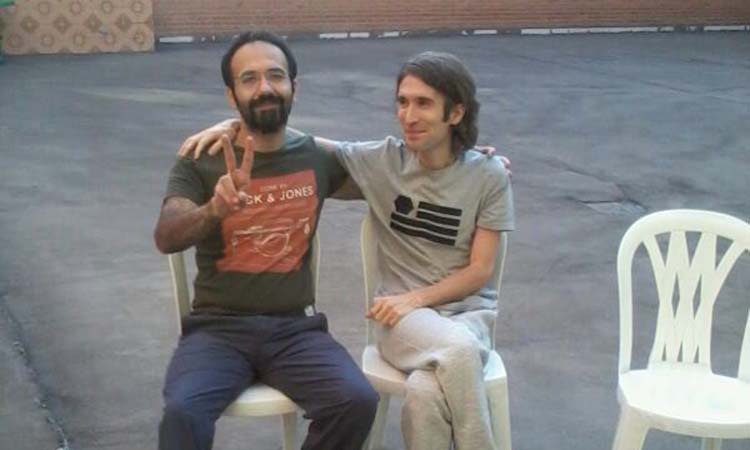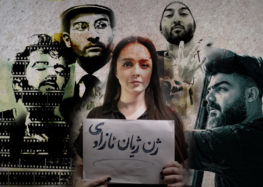Photo of Smiling Political Prisoners in Iran’s Evin Prison Lands One in Prison Known For Harsh Conditions

Arash Sadeghi (right) and Soheil Arabi in the courtyard of Evin Prison.
Lawyer: Arash Sadeghi’s transfer was illegal.
A man serving a 15-year prison sentence for peacefully advocating human rights in Iran has been transferred to a prison known for its inhumane conditions after photos of him smiling with other political prisoners surfaced on social media.
Arash Sadeghi was transferred from Evin Prison in Tehran to Rajaee Shahr Prison, 31 miles west of the city, on October 18, 2017, a source close to the Sadeghi family told the Center for Human Rights in Iran (CHRI).
The leaked photos show Sadeghi smiling in the courtyard of Evin Prison with prisoner of conscience Soheil Arabi and teachers’ rights advocate Esmail Abdi.
Political prisoners are not allowed cellphones in Evin Prison.
According to attorney Mahmoud Seifzadeh, transferring prisoners to facilities away from their hometown amounts to a harsher sentence without a court order and is therefore illegal.
“Iranian laws stipulate that prisoners should serve time in their city of residence, unless they are sentenced to a prison in exile,” said Seifzadeh in an interview with CHRI on October 18, 2017.
“Arash Sadeghi has been sentenced to prison, but the final verdict does not include exile,” he added. “Since he is a resident of Tehran, banishing him to a prison in Karaj is excessive punishment and a violation of the law by prison officials and judicial authorities.”
According to Article 13 of Iran’s Islamic Penal Code: “Imposing and executing a punishment or security and correctional measures shall not breach the limit and conditions specified in the law or the judgment…”
The transfer means that Sadeghi will no longer be able to have weekly visits with his wife, Golrokh Ebrahimi Iraee, who is serving a five-year sentence in Evin Prison’s Women’s Ward for writing an unpublished story about the practice of stoning in Iran and for the content of some of her personal Facebook posts.
In June 2016, Sadeghi was convicted of “assembly and collusion against national security,” “propaganda against the state,” “spreading lies in cyberspace,” and “insulting the founder of the Islamic Republic” for his peaceful defense of civil rights.
In August and September 2017, as many as 20 political prisoners in Rajaee Shahr Prison went on hunger strikes to protest the transfer of dozens of inmates without their belongings from Ward 12 to the security-enhanced Ward 10.
In December 2016, political prisoner Saeed Shirzad sewed his lips shut to hunger strike against what he described in a letter sent to judicial officials as “the quiet death of prisoners,” a reference to human rights violations suffered by prisoners at Rajaee Shahr Prison.
A prominent human rights lawyer who was incarcerated in Rajaee Shahr Prison told CHRI in April 2016 that “the prison was not in any condition to hold that many prisoners.”
“The clinic did not have medicines to treat anything worse than a cold, let alone high blood pressure,” said Mohammad Seifzadeh. “Bad nutrition and lack of vitamins weakened the prisoners.”
“Fruits and vegetables are non-existent,” he added. “Some of us prepared our own food. We gave a list of things we needed and they would buy it for us from outside at our own expense. But there were also those who only ate prison food. Two days a week there was stew and on other days it was only rice and soybean oil, which was greasy and unhealthy.”
“The cells had no ventilation,” said Seifzadeh. “In Evin Prison, the cell doors opened at a quarter to seven in the morning and you could take in fresh air until sunset, but in Rajaee Shahr we could only stay outside for three hours.”
*This article was revised on April 13, 2018, to reflect that Arash Sadeghi is serving a 15-year prison sentence, not a 19-year one.






